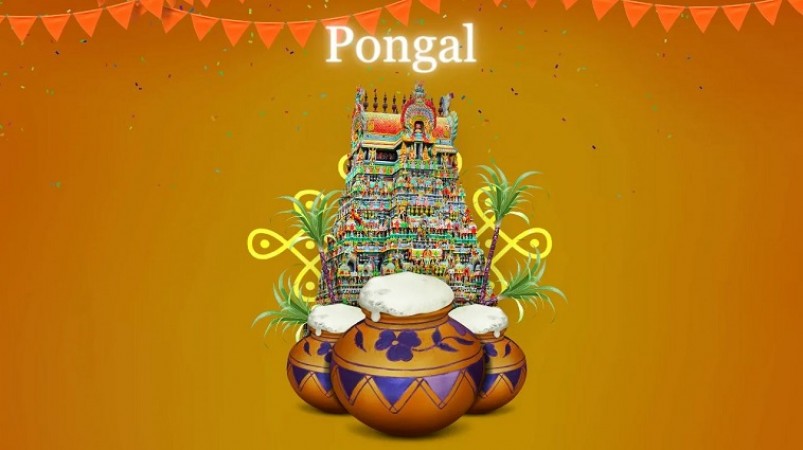
Pongal 2024: Explore Dates, Times, and Traditions Across Tamil Nadu, Andhra Pradesh, Karnataka, and Kerala - Pongal, the lively harvest festival, holds a special place in the hearts of South Indians, symbolizing gratitude towards nature and the abundant harvest that sustains life. Celebrated with immense enthusiasm, Pongal typically falls in mid-January, coinciding with the auspicious period of the Tamil month Thai. Spanning four joyous days, each day brings its own unique traditions and festivities.
Beyond its agricultural roots, Pongal is a celebration of abundance, togetherness, and the blessings of the sun god. The festival's highlight is the traditional dish, also named Pongal, prepared by boiling freshly harvested rice with milk and jaggery, symbolizing prosperity and the overflow of good fortune.
Pongal Traditions in Tamil Nadu
Thai Pongal Rituals: The main day, Thai Pongal, witnesses families gathering at sunrise to cook the traditional dish "Pongal" as an offering to the Sun God, expressing gratitude for a prosperous harvest.
Kolams and Decorations: Homes are adorned with colorful kolams (rangoli designs) to symbolize prosperity and create a festive atmosphere.
Cultural Events: Tamil Nadu showcases its cultural richness through traditional music, dance performances, and processions.
Pongal Dates and Timings in Tamil Nadu
The festival spans several days, starting with Bhogi Pongal on January 14th, Thai Pongal on January 15th, Maatu Pongal on January 16th, and concluding with Kaanum Pongal on January 17th. Pongal festivities typically begin with the preparation of the traditional dish "Pongal" at sunrise, as families gather to express gratitude to the Sun God for the harvest.
Pongal Traditions in Karnataka
Sankranti Celebrations: Pongal coincides with the festival of Sankranti in Karnataka, where people exchange ellu-bella, a mix of sesame seeds, jaggery, coconut, and groundnuts, symbolizing harmony.
Cow Worship: Maatu Pongal in Karnataka involves the worship of cows, similar to Tamil Nadu. Cattle are adorned with colorful accessories, and processions are organized.
Pongal Dates and Timings in Karnataka
In 2024, Pongal will commence on January 14th with Bhogi Pongal. Surya Pongal, dedicated to the sun god, will be celebrated on January 15th. The third day, Maattu Pongal, honors cattle for their vital role in agriculture and is observed on January 16th. The festivities conclude with Kaanum Pongal on January 17th, a day for family outings and reunions.
Pongal Traditions in Andhra Pradesh
Bhogi Panduga: Bhogi, the first day, is dedicated to Lord Indra, the god of clouds and rains. People discard old belongings, symbolizing new beginnings.
Haridasu Singing: In some regions, Haridasu, a traditional group of singers, visits homes singing devotional songs, adding a unique touch to the celebrations.
Pongal Dates and Timings in Andhra Pradesh
In Andhra Pradesh, the Pongal festival follows a schedule similar to Tamil Nadu. The main day, Thai Pongal, is celebrated on January 15th, with festivities starting with Bhogi Pongal on January 14th, followed by Maatu Pongal on January 16th, and Kaanum Pongal on January 17th. The celebration involves traditional rituals, cooking the special Pongal dish, and engaging in various cultural activities to express gratitude for the harvest.
Pongal Traditions in Kerala
Harvest Festival: Pongal in Kerala is celebrated as a harvest festival known as ‘Makaravilakku.’ Devotees go to Sabarimala, lighting lamps in a sacred ceremony.
Feast and Community Gatherings: Families come together for elaborate feasts, and community events feature traditional art forms like Kathakali and Mohiniyattam.
Pongal Dates and Timings in Kerala
In Kerala, Pongal, the joyous harvest festival, will be celebrated with enthusiasm in 2024. The festival spans several days, starting with Bhogi Pongal on January 14th, Thai Pongal on January 15th, Maatu Pongal on January 16th, and concluding with Kaanum Pongal on January 17th. Festivities traditionally begin at sunrise with the preparation of the special dish "Pongal" as an offering to the Sun God. Families come together to express gratitude for the harvest, partake in cultural customs, and create an atmosphere of joy and togetherness.